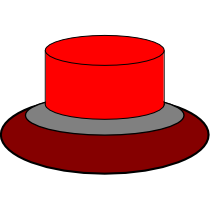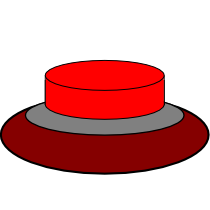Indefinite Pronouns
Words like who, what, someone, no-one, something, nothing are indefinite prounouns. In Pashto these are all based off of two main words.
- څه - tsu (something / what)
- څوک - tsok (someone / who)
| | |
|---|
What / something Sing. or Plural | | |
Who / someone Sing. or Plural | | |
The word څه - tsu (what) is used to talk about an unspecified thing or things. It can either be used in a question, meaning "what?" or in a statement meaning "something."
ته څه کوې؟
tu tsu kawé?
What are you doing
څه وخرو؟
tsu óokhroo?
What should we eat?
هغه په کور کې څه کوي
haghá pu kor ke tsu kawée
He's doing something at home
هتله به څه وخرو
halta ba tsu óokhroo
We'll eat something over there
په اسمان کې څه ځلېږي
pu asmaan ke tsu dzaléGee
Something is shining in the sky.
په اسمان کې څه ځلېږي؟
pu asmaan ke tsu dzaléGee?
What is shining in the sky?
The word څوک - tsok (who) is used to talk about an unspecified person or people (or animals). It can either be used in a question, meaning "who?" or in a statement meaning "someone."
ته څوک یې؟
tu tsok ye?
Who are you?
څوک خبرې کوي؟
tsok khabúre kawée?
Who is speaking?
څوک راځي؟
tsok raadzée?
Who is coming?
څوک راځي.
tsok raadzée.
Someone is coming.
When we need to inflect څوک - tsok it changes to چا - chaa. The word څوک - tsok can be singular or plural, so it will not inflect for being plural. But it will inflect for the other two reasons:
- being the subject of a past tense transitive verb
- being in a sandwich
چا زه ووهلم؟
chaa zu óowahulum?
Who hit me?
Inflected because it's the subject of a past tense transitive verb
دا وریژې چا وخوړلې؟
daa wrijze chaa óokhoRule?
Who ate that rice?
Inflected because it's the subject of a past tense transitive verb
چا به ته لیدلی یې.
chaa ba tu leedúlay ye.
Someone will have seen you.
Inflected because it's the subject of a past tense transitive verb
ته له چا سره خبرې کوې؟
tu la chaa sara khabúre kawé?
Who are you talking with?
Inflected because it's in a sandwich
زه به دا کتاب چا ته ورکړم.
zu ba daa kitáab chaa ta wárkRum.
I will give this book to someone.
Inflected because it's in a sandwich
It's important to remember that څوک - tsok does not inflect as an object for the present/future tense. It is essentially a third-person pronoun, so it does not inflect like 1st and 2nd person pronouns do.
زه تا وینم.
zu taa wéenum.
I see you.
Inflected because it's a 1st/2nd pers. pronoun used as an object for the present/future tense.
زه څوک وینم.
zu tsok wéenum.
I see someone.
Does NOT inflect because it's not a 1st/2nd pers. pronoun.
❌ زه چا وینم.
❌ zu cháa wéenum.
I see someone.
This is incorrect. The pronoun should not be inflected.
By default, these indefinite pronouns are considered masculine plural. When the indefinite pronoun is the king of the sentence, the verb will be 3rd person masculine plural.
In rare cases where we know they are for sure referring to some specific thing or person, then they can take a different gender and number.
تا څه کول؟
taa tsu kawúl?
What were you doing?
The object څه, is masculine plural. Here the object is king. The verb is 3rd pers. masc. plural
تا څه لیدلي دي؟
taa tsu leedúlee dee?
What did you see?
The object څه, is masculine plural. Here the object is king. The verb is 3rd pers. masc. plural
څه شوي دي؟
tsu shúwee dee?
What happened?
The subject څه is masculine plural. Here the subject is king. The verb is 3rd pers. masc. plural
څوک نه دي راغلي
tsok nú dee raaghúlee
Nobody has come. (lit. Someone has not come - meaning no person/people have come)
The subject څوک is masculine plural. Here the subject is king. The verb is 3rd pers. masc. plural
The words هر - har (every), هیڅ - heets (no), and یو - yo (one) can be combined to form the following indefinite articles. Inflection works just the same.
-
هر څوک - har tsok (everybody)
-
هر څه - har tsu (everything)
هر څه ولرې او دوستان ونه لرې...
har tsu óolare aw dostáan on-nú lare...
If you have everything and don't have friends...
هر څوک خاشحاله دي
har tsok khoshháala dee
Everyone is happy
هر چا دا لوبه ولیده
har chaa daa lóba óoleeda
Everyone saw that game
Inflected because it is the subject of a past tense transitive verb
له هر چا سره ملګرتیا مه کوه!
la har chaa sara malgurtyáa má kawa!
Don't make friends with everyone!
Inflected because it is in a sandwich
-
هیڅ څوک - heets tsok (nobody)
- inflects to هیڅ چا - heets chaa or جیچا - heechaa
-
هیڅ څه - heets tsu (nothing)
These negative forms are used with negative verbs and equatives to make a double negative for emphasis.
دلته څه نشته
dalta tsu nushta
There is nothing here
Here څه means 'nothing' because of negative نشته
دلته هیڅ څه نشته
dalta heets tsu nushta
There is absolutely nothing here
Double negative (هیڅ څه and نشته) for emphasis
❌ دلته هیڅ څه شته
❌ dalta heets tsu shta
There is nothing here
You can't use هیڅ څه with a positive phrase (شته)
چا نه دي وایلي چې...
chaa nú dee waayulee che...
Nobody has said that...
inflected as the subject of a past tense transitive verb
هیڅ چا نه دي وایلي چې...
heets chaa nú dee waayulee che...
Absolutely nobody has said that...
Double negative (هیڅ چا and نه دي وایلي) for emphasis
❌ هیڅ چا وایلي دي چې...
❌ heets chaa waayulee dee che...
Nobody has said that...
You can't use هیڅ چا with a positive verb (وایلي دي)
-
یو څوک - yo tsok (someone)
-
یو څه - yo tsu (something)
These forms can be used to emphasize that you are talking about one person, or about a little, or one, of something.
زه باید یو څه وکړم!
zu baayad yo tsu óokRum!
I have to do (at least) something!
کله چې یو څوک تا ته خفه وي...
kala che yo tsok taa ta khufá wee...
When somone (one person) is upset with you...
Note that یو څه - yo tsu and څه - tsu can also be used as intensifiers with adjectives to mean "somewhat" or "a little."
هغه له ما نه یو څه خفه دی
haghá la maa na yo tsu khufá day
He's a little upset with me

